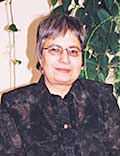|
The Life Is Beautiful

Dear Readers,
It happened that on St.Valentine’s Day, I had a very personal experience of an organisation which is very closely connected with the symbol of the holiday – the heart. This organisation is the Samara Cardio-Centre. I must confess I was very impressed by the standard of treatment, modern equipment and highly qualified doctors I found there. It proves the truth of the statement that health service is one of the major priorities of the Government of the Russian Federation.
During my stay at the centre, I was visited by my relatives, colleagues and friends. My daughter Elena came specially from Georgia. I got a ‘Get well’ card from my friend David Wright and thought that such a small ‘piece of heart’ sent from a friend can raise one’s spirit and make one smile. I also thought that our life in Russia is improving and things we could not dream of several years ago are now quite available in this country. Life is beautiful! I would like to express my gratitude and cordial thanks to all my colleagues, students, friends and relatives for their support and good wishes.
Next to this column you will find some material about the National Health Service in Great Britain.
Nadezhda
The British National Health Service
by David Wright
The National Health Service (NHS) was set up in 1948 when the UK government was trying to fulfil the hopes and aspirations of a people recently emerged from the rigours of WWII1. It was a time for great changes; people were no longer satisfied with the way things had been before the war and there was a general air of expectation that we were entering a new era – a brave new world!
 Надежда Никифоровна Рогожина
Надежда Никифоровна Рогожина, проректор по международным программам, зав. кафедрой лингвистики и межъязыковой коммуникации Самарского муниципального университета Наяновой, кандидат педагогических наук, доцент.
Директор негосударственного учреждения дополнительного образования “World Class-Samara”.
Before the war, health care for the poorer classes was expensive, rudimentary at best and often non-existent. It depended largely on various charities established by the church or endowed by wealthy men. The new system of health care would be ‘free at the point of delivery’. Of course it would have to be paid for somehow, but a patient would not be charged for any treatment that was considered necessary. Payment would be from general taxation, including the income tax levied on everyone in paid employment2.
In parallel with the NHS, independent private services3 still exist for those who wish (and can afford) to use them, including some hospitals, dentists, osteopaths, etc.
From those early small beginnings, the NHS has grown to become the largest organisation in Europe4 and reputed to be one of the largest employers in the world5. The demand for health care is endless, often referred to as a ‘bottomless pit’, consuming all the resources that could possible be devoted to it. People’s expectations have grown to demand more than basic ‘necessary’ care. However good the system is, human nature is such that it will never be good enough. Now services are included which relate more to life style than health, such as cosmetic surgery, contraceptive devices, free ‘recreational’ drugs and hypodermic needles, etc.
It is not only in financial aspects that supply lags behind demand. Human resources, doctors, nurses, clinical technicians, etc, are also in short supply. Many students nowadays opt to study ‘easier’ subjects at school and university, with a consequent neglect of the ‘difficult’ sciences needed to qualify as a medical professional6. The result is that many NHS staff come from other countries, attracted by comparatively high salaries. We benefit, but the countries from which these doctors come are denuded of their often desperately needed services and that raises moral questions. Despite these well-publicised shortages, when visiting a hospital, I am often struck by the huge numbers of administrative staff, usually walking around with armfuls of files containing patients’ records that have not yet been adequately computerised.
As costs mounted, a charge was made for prescribed medicines and this increases year by year7. Charges are also made for services such as opticians and dentistry, unless one is exempt8.
The NHS claims that it is changing the way it works and is structured to cope with the demands of the 21st century by ensuring that ‘patients always come first’9. Patients are being encouraged to become more responsible for their own care, and given some choice about how, when and where they are treated. The laudable aim is that patients should receive the best health care, quickly and conveniently, when and where they need it.
To be concluded...
1 The Second World War, 1939-1945.
2 In addition, a separate income tax is levied, called a ‘national health contribution’ to make it sound like a voluntary scheme. This ‘contribution’ is not hypothecated (ring-fenced for the sole purpose for which it is named) any more than the road fund licence is devoted to the up-keep of roads.
3 Known as ‘the independent sector.
4 The EU bureaucracy is doing its best to catch up.
5 As of March 2005, the NHS has 1.3 million employees, and is variously the third or fifth largest employer in the world, after the Chinese Army, Indian Railways and (as argued by Jon Hibbs, the NHS’s head of news, in a press release from March 22, 2005) Wal-Mart and the US Department of Defense.
6 It was reported today (15.2.06) that a quarter of trainee nurses quit their courses before completion, costing the taxpayer an estimated 57 million a year.
7 Many people are exempt from this charge, including pensioners like me!
8 I am required to pay half the cost of normal treatment.
9 This is sometimes taken to extremes, eg an underage girl may be given an abortion without even her parents’ knowledge.
Читать еще в этой рубрике:
Читать еще в этом номере:
|
|











